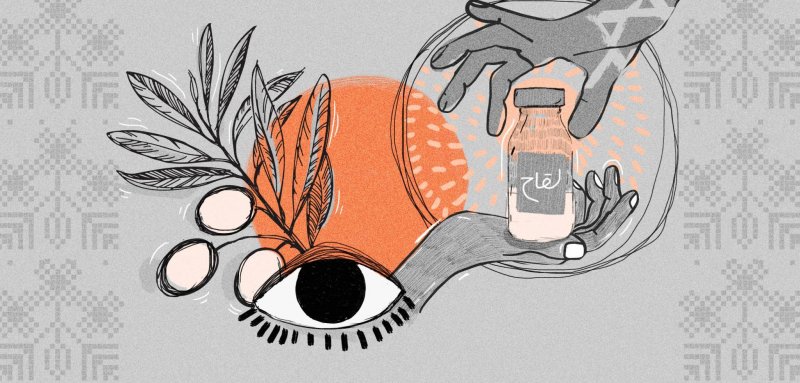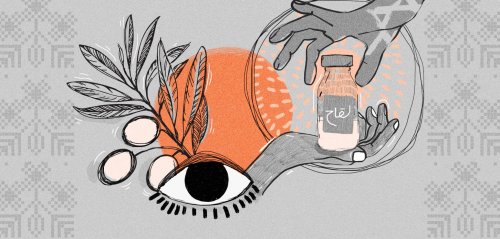Daraj and Raseef22 collaborated in assessing the vaccine rollout in Palestine and Yemen in light of the challenges these two countries face: Administrative shortcomings and corrupt systems. This is the first report from Palestine.
While Israel is vaccinating its citizens at record speed, questions marks continue to hover over Palestine. Will Israel allow the vaccine to enter Gaza? Or only in exchange for its missing soldiers? Is the vaccine safe? Will it work? On the West Bank the PA has started vaccinating, but what is the plan? Who will go first? The most needy? Or the most greedy?
According to Israeli media, Israeli Defense Minister Benny Gantz on February 14 finally agreed to transfer the Covid-19 vaccine to Gaza. So far, however, it remains to be seen if and how many vaccines will be allowed to enter, and under what conditions. Many people fear Israel will demand for Hamas to release the soldiers captured during the 2014 Gaza War or return their remains.
Meanwhile, the Palestinian Authority (PA) announced the start of its vaccination campaign in the West Bank, yet without any clear plan and amidst widespread fear that favouritism and nepotism will take over.
To date, Palestine has recorded more than 188,000 coronavirus cases and over 2,000 deaths, a quarter of which in Gaza. And the numbers are rising at a decisive moment in time, as many Palestinians are raising questions about the quality of the vaccine and the integrity of their officials, while preparing for the elections in May.
The latter come amidst a deeply divided political landscape, which is not likely to change anytime soon. Actually, the dialogue between the Palestinian factions that took place in Cairo on February 9, only fuelled the general climate of cynicism and disunity, as they agreed to hold elections, while postponing talks on such all-important files as the division between Fatah and Hamas.
How do these internal political troubles and the reality of the occupation affect Palestinian society and its efforts to fight the coronavirus?
Vaccination: What Destination?
While the PA has started to receive the vaccine and begun vaccinating healthcare workers and others, Gaza’s share in receiving the vaccine remains unknown. Magdy Dahir, Deputy Director of Primary Care at the Gaza Ministry of Health on February 8 stated that the ministry is still awaiting delivery of the Russian Sputnik vaccine, which was set to arrive via the West Bank on February 14. So far, however, nothing has entered Gaza yet.
In fact, Israel’s Channel 7 reported on February 1, the very day that the first vaccines arrived in the West Bank, that Israel will not allow any vaccines to enter Gaza.
According to the Ministry of Health, Gaza needs to vaccinate about one million people, excluding those under the age of 18 and pregnant women. The people who most urgently need vaccination number up to 200,000. They include healthcare workers, the elderly and patients suffering from cancer or other chronic diseases.
According to PA Prime Minister Muhammad Shtayyeh, the vaccination process in the West Bank started in mid-February. He also said the vaccines will continue to arrive from multiple sources. The vaccination process is supposed to start with the most vulnerable. However, the PA stands accused of a lack of transparency and integrity, following the publication of pictures of officials and non-health workers being vaccinated.
The Palestinian Ministry of Health last month announced it had received the first batch of the Moderna vaccine, which consisted of 2,000 doses, without mentioning its source. The ministry did say it was to receive another 50,000 doses, yet without specifying quality or time of arrival.
The ministry furthermore stated it had received 10,000 doses of the Sputnik vaccine, part of which it will send to Gaza. However, as said, this has not happened yet.
Lack of Confidence
Both Gaza and the West Bank are ruled by a sense of mistrust, due to a number of circumstances, including a lack of confidence in the authorities, the Israeli occupation, and a fear that the vaccines do not comply with existing health standards.
Both Gaza and the West Bank are ruled by a sense of mistrust, due to a number of circumstances, including a lack of confidence in the authorities, the Israeli occupation, and a fear the #COVID19 vaccines do not comply with existing health standards
When asking people’s opinions about the vaccine in the streets of Gaza, some replied they would take the dose as soon as it was available. Most people, however, did not accept the notion of vaccination. Among them, some did not believe the virus even existed. To them it is merely a political matter. Others were convinced the vaccine would not protect them.
Again others feared Israel would allow expired vaccines to enter Gaza, while all people surveyed were convinced that Israel, which has restricted the supply of medical equipment to Gaza for years, would only allow the vaccine to enter for a hefty political price.
In the West Bank too people doubted the vaccine’s effectiveness and wondered if it complied with rules and regulations. They furthermore questioned if the vaccines were the same as used in Europe. Could it be that third world countries received experimental vaccines?
“We vaccinated medical staff in non-governmental and private hospitals,” Saad Daoud, a preventive medicine physician, told Daraj. “We reiterate that Gaza will receive the same type and the share of vaccines as the West Bank. We recently bought the Russian vaccine and vaccination will take place in 45 centres.”
Daoud emphasised he did do not doubt the efficacy of the vaccine and rejected the idea that vaccines for third world countries would somehow be different from those used elsewhere. Still, some Palestinian leaders continued to question the vaccine, which is likely to affect public opinion.
“The warnings of international doctors regarding the vaccinations deserve to be taken into account,” Hamas official and former Minister of Prisoners Wasfi Qabha told Daraj. “Some of them refuse to use untested vaccines. So how can we, as Palestinians, accept them without verifying their effectiveness?”
Little Hope to Get the Vaccine
The fact is, Palestinians, especially in Gaza, have suffered for years from an ailing health sector largely as a result of the Israeli blockade, it is understandable there are doubts over the #COVIDー19 vaccine and the Israeli willingness to provide it. However, there can be no doubt over the realness and danger of the virus itself.
The fact is, Palestinians, especially in #Gaza, have suffered for years from an ailing health sector largely as a result of the Israeli blockade, it is understandable there are doubts over the #COVIDー19 vaccine and the Israeli willingness to provide it
For that reason we documented the following cases in the Gaza Strip, including the one of 62-year-old Fayza Awad, who suffers from diabetes, high blood pressure and kidney failure. In December 2020, she suddenly faced a severe fever, abdominal pains, loss of appetite and shortness of breath. A medical examination confirmed she had been infected.
She was transferred to the European Hospital. Her health condition rapidly deteriorated to the point she lost consciousness due to a lack of oxygen (hypoxia), which prompted her uninfected daughter to go to the hospital to stay with her. At some point Fayza was unable to even move.
“I reached a stage of hallucinations and lost consciousness,” she said. “Around me patients were dying daily as their bodies weren’t able to resist the virus.”
Fayza survived after she was given oxygen. However, she still suffers from pain in her chest and lungs. Doctors say her body would continue to be affected by the virus over the next six months due to her weak immune system.
“I have a feeling the vaccine will not make it here given the weak economic and political status of our country,” Fayza said. “I hope it will, so I can get a dose. But I hold out little hope.”
Rajai Al-Shatli, a 43-year-old journalist, also started to feel unwell in December. He suspected he might have contracted influenza or possibly the coronavirus. He consulted a doctor and started taking antibiotics, vitamin C and zinc. A week passed and his health only deteriorated.
“I took a test and the result was positive,” he said. “My health continued to worsen. I suffered from severe shortness of breath, so I went to the Shifa Hospital, where they found the level of oxygen in my blood had decreased to 75%.”
He received a treatment for two weeks, until his health improved.
“The vaccine is important to all of us, as it protects us from the virus,” Shatli said. “It is surprising how some people are afraid of possible side effects, although the percentage of people who actually had side effects is negligible compared to the number of people who received the vaccine.”
Don’t Believe in the Virus? Go See the European Hospital
29-year-old Reham Ahmed contracted the virus from her husband Saeed, who suffers from several chronic diseases. As soon as the 32-year-old was infected, his health rapidly deteriorated. He was transferred to the European Hospital, Gaza’s designated Covid-19 hospital.
“Even though we took all necessary precautions, we contracted the virus,” said Reham, who suffered from fever and joint pain. She accompanied her husband during his treatment in the European Hospital. His blood oxygen levels had decreased to less than 60%, which forced the doctors to provide him with oxygen for several days until his health improved.
During their 21-day stay in hospital they witnessed dozens of patients infected with the virus. The vast majority of them suffered from extreme fatigue. The hospital was able to treat some 300 severe cases.
“All those people who still don’t believe in the virus and its dangerous effects on the body, go visit the European Hospital and see with your own eyes how the patients are suffering, especially those with chronic diseases,” said Reham.
Regarding the vaccine, Reham said she and her husband had been closely following the news about the vaccine even before they were infected. They are ready to get vaccinated as soon as it becomes available. It is only because the vaccine had not arrived earlier, they got infected.
“We were at risk of dying any moment,” Reham said. “Without the grace of God, I would have lost my husband. I hope the vaccine becomes available for everyone so we can get rid of the virus.”
Who is Responsible for Providing the Vaccine?
According to the Oslo Accords, the PA is in charge of public health care with an eye on one day obtaining the full right to self-determination. On paper therefore it is the PA that must undertake the task of providing the vaccine.
However, the reality on the ground cannot be ignored. On the one hand, Israel fully controls Palestinian imports and exports, which makes it extremely difficult for the PA to implement its task.
On the other hand, the Oslo Accords clearly state: “Israel and the Palestinian side shall exchange information regarding epidemics and contagious diseases, shall cooperate in combating them, and shall develop methods for the exchange of medical files and documents.”
The Oslo Accords clearly state: “Israel and the Palestinian side shall exchange information regarding epidemics and contagious diseases, shall cooperate in combating them, and shall develop methods for the exchange of medical files and documents
Adhering to international law and recommendations issued by international human rights organizations, the PA has called upon Israel to urgently provide the vaccine in both the West Bank and Gaza Strip.
Meanwhile, the United Nations Relief and Works Agency for Palestine Refugees in the Near East (UNRWA) has not yet announced any measures to provide vaccines in the camps of the Gaza Strip, the West Bank and diaspora.
“The agency will not provide vaccines to any Palestinian refugees,” said Adnan Abu Hasna, UNRWA spokesperson in the Gaza Strip. “UNRWA’s role is limited to assisting in the implementation of the vaccination process in Gaza and elsewhere in the region.’
Hamas: Playing the Waiting Game
While the debate mainly focuses on obtaining the green light from the Israel as the occupying power to be able to introduce the vaccine in Gaza, as well as the PA’s position on the transfer of the vaccine, Hamas claims it is ready to deliver.
“Hamas is keen to smoothly deliver the vaccine to the citizens of the Gaza Strip,” said a senior Hamas source. “Hamas has contacted several regional and international parties during the past few weeks to request delivery of the vaccine.”
“Hamas has also worked to build rooms for the quarantined and pressured Israel to provide testing tools,” said the source who preferred to remain anonymous, as he was not authorized to disclose information to the media. “Hamas also made efforts to find Arab and international parties that can provide the Gaza Strip with aid. “
The source refused to confirm whether there were indirect negotiations with Israel regarding the introduction of the vaccine.
“The residents of Gaza have the right to receive the vaccine like any other people in the world, and Hamas will not remain silent in the face of any Israeli measure that may hinder the entry of the vaccine,” the source said.
Will the Israeli Defense Minister Keep His Word?
On February 14, the Israeli Walla website announced that Israeli Defense Minister Benny Gantz had agreed with the PA to transfer the vaccine to Gaza. A formal decision is expected soon in this regard. According to the site, the approval was due to “the high number of sick in Gaza and fear for a possible security escalation.”
However, Israel's actions towards the besieged Gaza Strip so far make the decision and its implementation look suspicious.
“Despite signing the Oslo Accords, Israel continues to exercise its powers on the ground as an occupying force,” said Mustafa Ibrahim coordinator of the Advocacy Unit at the Independent Commission for Human Rights (ICHR) in Gaza. “This despite the fact that, according to the international law, it has a duty to provide the residents with all necessary supplies.”
“According to the Fourth Geneva Convention, Israel is obliged to provide the vaccine in Gaza and the West Bank,” he continued. “The Israeli claims that it is not obliged to provide the vaccine are false.”
Ibrahim furthermore stressed that “Israel's attempts to exploit the issue of vaccination for political or military gains is contrary to all international conventions.”
Like other human rights defenders, Ibrahim has closely monitored Israel's statements that it would not provide the Gaza Strip with the vaccine. However, he expected that: “Israel will be forced, under international pressure, to deliver the vaccine to the people of Gaza.”
Blackmail: the Vaccine for Soldiers
Israeli media have reported that the Israeli army is linking the issue of introducing the vaccine in Gaza to the release of the Israeli soldiers who were imprisoned during the 2014 war with Hamas.
“Yet Israel knows very well this is unrealistic and that Hamas will not accept,” said the senior Hamas source. “Hamas refuses to open the soldiers' file in any context other than an exchange deal.”
Adding: “the vaccine is a right guaranteed by all charters, and Israel has no right to bargain for political gains. Israel also has no right to use this issue as a tool to satisfy Israeli public opinion, and cover up its failure to take back the captured soldiers. “
Hamas official Wasfi Qabha confirmed that Israel had tried to blackmail Gaza by demanding it to reveal the fate of the soldiers who disappeared during Operation Eaten Straw in 2014.
“In return, Israel would accept to introduce the vaccines,” Qabha said. “It is sadistic and immoral, yet behavior like that has come to be expected from the occupation. Not to mention the PA which is contributing to besieging Gaza and depriving it of vaccines.”
“But just as the vaccine will reach the Ramallah government, it must arrive in Gaza,” he continued. “Furthermore, the vaccine must be guaranteed by the World Health Organization (WHO) and the PA. A Palestinian citizen must be given what any American, British or French citizen is given.”
“There are two possible scenarios for Hamas,” said political analyst Sharhabeel Al-Gharib. “The first is to resort to military escalation, which is what Israel fears the most. Hamas can exploit the situation and demand a vaccine through Arab mediators. The second scenario is to obtain Palestinian rights by legal means.”
Meaning: the movement can use the virus to advocate to the world that Israel is an occupying power with the responsibility to provide Gazans with the vaccine.
The Emirati Airplane
On June 9, 2020, the Palestinians were surprised to see an Emirati plane arrive at Israel’s Ben Gurion Airport. It was said the plane carried medical aid for the PA and Gaza Strip and that its arrival had been coordinated with the Israelis.
However, the PA refused to receive the shipment, as the shipment had not been coordinated with the Palestinian side. Days later, another plane arrived, and again the PA refused to receive it. The United Arab Emirates (UAE) then decided that a medical aid convoy would use the Rafah crossing to supply the Gaza Strip only.
The convoy was received by the Gaza Minister of Health and delegations from Hamas and the Fatah Democratic Reform Bloc, affiliated with Muhammad Dahlan, who has lived in the UAE for years. A source close to Dahlan said the UAE is planning to send a third aid convoy.
Nepotism and Favoritism
In the West Bank, the PA is facing criticism over the fair distribution of the vaccine and the lack of a transparent government policy. Fairness and transparency regarding vaccine distribution are in fact a global problem facing many people in many countries..
The European Parliament's Public Health Committee, for example, has called for a clear-cut approach for the vaccine’s distribution within the European Union to avoid any misunderstandings.
Social media platforms in Palestine have been buzzing with pictures of officials receiving the vaccine. This was by many considered an infringement on what had been announced by the Ministry of Health, as the first batch was meant for vaccinating healthcare workers.
Hence, the Coalition for Accountability and Integrity (AMAN) reiterated its demand for the publication of a vaccine distribution plan with fair and impartial standards, so that priority will be given to those who need it most.
“This will enhance citizens' confidence in the procedures and the standards followed by the official authorities,” AMAN wrote on its Facebook page. AMAN furthermore warned against nepotism and favoritism and has called for forming a government committee, which in partnership with the private sector, should develop a distribution plan.
Conflicting Statements
“Since the outbreak of the pandemic, AMAN has issued several recommendations to enhance integrity in the crisis management process,” said Hamma Zeidan, director of the organization’s Advocacy and Community Accountability Unit. “After reviewing the experiences of other countries, it was clear that such a process takes months. We urged the government therefore to develop a plan and highlighted the need to form a team of experts to manage the issue.”
Zeidan explained that AMAN furthermore called for preparing a list of health data and medical records for all citizens in order to easily identify those with chronic diseases who need the vaccine the most. In many countries such records proved extremely time-saving.
“To this day, we have not received a proper government response to our request to publish a vaccine management plan and prepare medical records,” said Zeidan, adding that there have been many conflicting statements issued by various government agencies. As a result, there is a lot of confusion: citizens have no idea about how many vaccines will arrive, where from, and how they will be distributed.
Corruption
“In the past, distributing medication to chronic disease patients was marked by nepotism,” said AMAN advisor Azmi Al-Shaabi explaining the organization’s fear for favoritism and corruption to prevent a fair distribution of the vaccine. “Detailed lists must be established, with a priority for those most in need. The Palestinian Central Bureau of Statistics can help creating such a system.”
“The Palestinians do not always trust those who govern them and believe that corruption exists,” said the ICHR’s Mustafa Ibrahim. “The responsibility to purchase, provide and distribute the vaccine is purely a governmental responsibility.”
“There are priorities in the distribution and vaccination process,” he added. “In order to meet such priorities, direct monitoring bodies such as human rights organizations and civil society institutions must be present. They must start their work as soon as the vaccine is received. However, so far this hasn’t been the case, and the authorities haven’t fully exercised their role.”
According to international law, everyone is entitled to enjoy the highest possible level of physical and mental health without any discrimination. The 1966 International Covenant on Civil and Political Rights, for example, guarantees the right of each person to obtain a vaccine to protect them from viruses and epidemics.
However, how can such a right be preserved in the West Bank and Gaza, which are ruled by an infectious mix of occupation, division, and corruption?
رصيف22 منظمة غير ربحية. الأموال التي نجمعها من ناس رصيف، والتمويل المؤسسي، يذهبان مباشرةً إلى دعم عملنا الصحافي. نحن لا نحصل على تمويل من الشركات الكبرى، أو تمويل سياسي، ولا ننشر محتوى مدفوعاً.
لدعم صحافتنا المعنية بالشأن العام أولاً، ولتبقى صفحاتنا متاحةً لكل القرّاء، انقر هنا.






